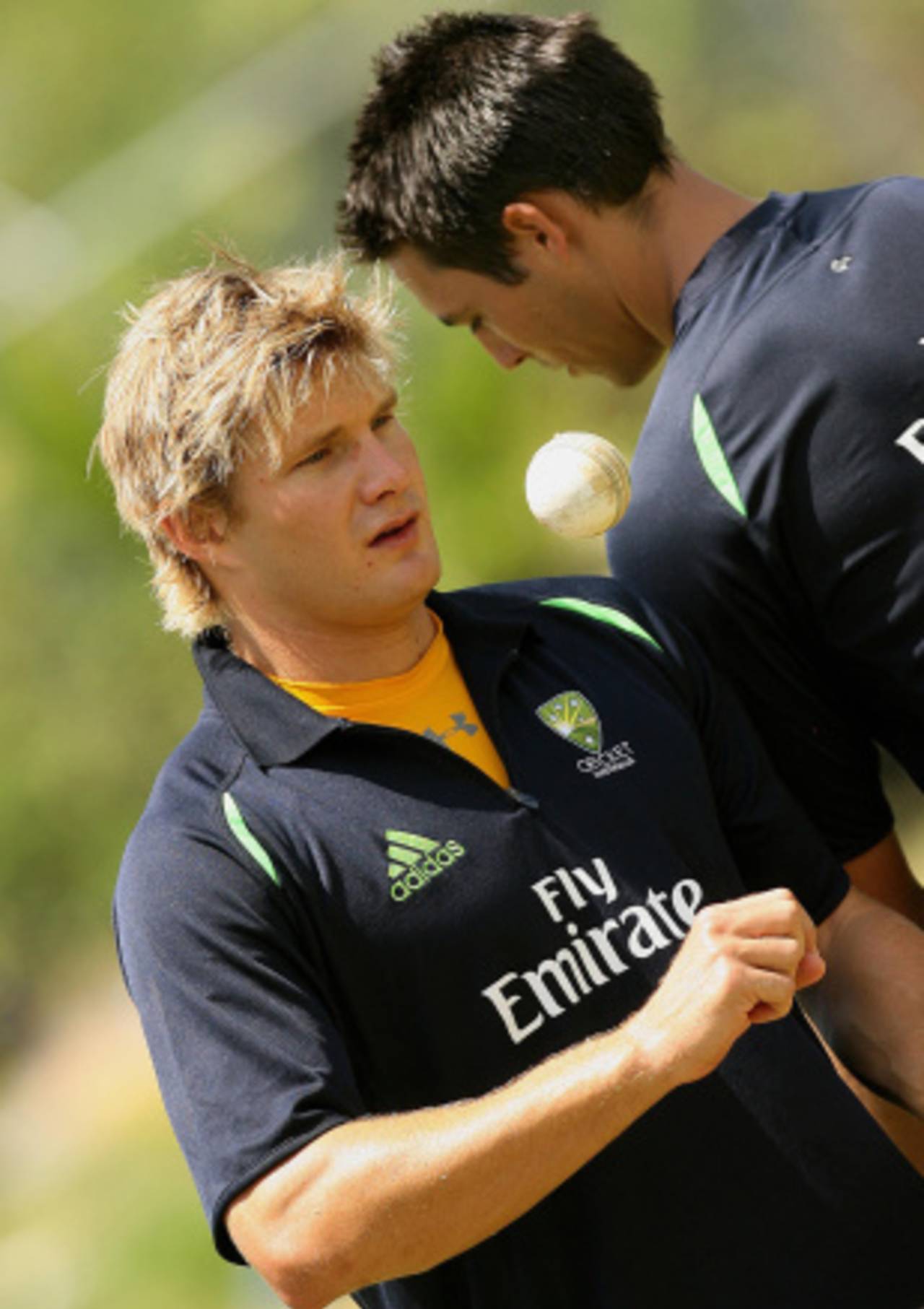The Watson and Johnson question marks
If the two won't be fit and ready for the Ashes, how will Australia's selectors spread the bowling load and boost the batting?
Ian Chappell
Nov 17, 2013, 2:42 AM

Australia are beleaguered with ifs and buts because of Johnson and Watson • Getty Images
I've reached an age where memory lapses become a concern, and I'm wondering if I only imagined Australia's recent heavy Test losses to India and then England. Didn't those 4-0 and 3-0 losses occur?
I only ask because ever since England landed in Australia, it's all been about the problems facing the tourists and how the home side is settled and in good shape for the upcoming Ashes series.
Sure, England have a few queries. There's Matt Prior's injury, the late change to Michael Carberry as an opening batsman, and also settling on a third fast bowler. Chris Tremlett appears to be down on pace, Steven Finn is inconsistent - fast and bouncy one minute and distinctly unthreatening the next - and Boyd Rankin is both unproven and a liability in the field. Nevertheless, that still leaves the bulk of the England side settled and successful.
Australia, on the other hand, with no recent success stories to fall back on, should have concerns. The two biggest headaches for them are the fitness of Shane Watson and the form of Mitchell Johnson. What if Johnson reverts to type and is profligate in an Ashes series? That will put an unbearably heavy load on the two critical fast bowlers, Peter Siddle and Ryan Harris, who both need to be at their best for Australia to remain competitive. And that doesn't even address the matter of the huge confidence boost it'll be for Alastair Cook if Johnson keeps angling deliveries on to his pads like he did at Lord's in 2009.
Watson is just as critical to the batting effort and his latest injury means he has had no time in the centre for a month leading into the first Test. That gives the England bowlers a distinct advantage, and a slow start for Watson with the bat could have serious implications for Michael Clarke and the middle order.
Despite some encouraging signs, Steve Smith still needs to prove he can consistently make big scores against top-quality bowling. He'll be further challenged if Australia don't get good contributions from the top-order players. Following Smith will either be an unknown quantity in debutant George Bailey, or Brad Haddin, who is showing signs that age is starting to win the battle when he's batting.
This is where the selectors face a real dilemma. Do they sacrifice a batsman to fit James Faulkner into the side to provide cover for any Johnson profligacy, or do they forgo variety and leave Nathan Lyon out and play the allrounder in an all-pace attack?
Lyon is a good bowler but too often the quality of his deliveries isn't matched by the results in the wicket column. Nevertheless it's a huge gamble to play a five-day game at the Gabba without a spinner.
Either way, the Australian line-up is desperately short of good catching men and it'll be a blessing for Clarke if Watson can't bowl, because they'll struggle to fill three slip positions adequately without him in the cordon.
There's potential for improvement in the Australian batting line-up and it'll be especially encouraging for the future if both Warner and Smith have a good series. The bowling is a pretty well-known quantity, unless Johnson does rediscover his best form. Then there's a real edge to the attack.
England, meanwhile, are tried and tested and what you see is what you get. The success of the batting will revolve around Cook and Jonathan Trott scoring heavily so Kevin Pietersen and Ian Bell can take advantage of a good start to elevate the scoring rate. The bowling will live or die on the form of Jimmy Anderson, Stuart Broad and Graeme Swann.
If Joe Root continues to improve and Finn finds consistency at Test level, it would augur well for England's future.
There's always a lot of bluff and bluster in the lead-up to an Ashes series and the reality is there are generally more ifs and buts than certainties. On this occasion Australia have more ifs, while England are superior in the number of proven performers. And unless my memory's playing tricks, that means the tourists will start as favourites.
Former Australia captain Ian Chappell is now a cricket commentator for Channel 9, and a columnist